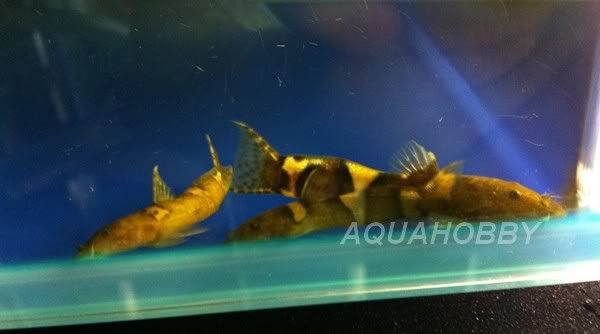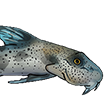Astroblepus mancoi
- amiidae
- Posts: 603
- Joined: 25 Nov 2004, 13:19
- My images: 544
- My cats species list: 82 (i:0, k:1)
- Spotted: 179
- Location 1: Singapore
- Location 2: Singapore
- Contact:
Astroblepus mancoi
Hi,
May I know the basic husbandry for this cat ? whats the diet ?
Thanks
ben
May I know the basic husbandry for this cat ? whats the diet ?
Thanks
ben
PREDATORY FISH KEEPERS FB GROUP --> https://www.facebook.com/groups/166535030633179/
- MatsP
- Posts: 21038
- Joined: 06 Oct 2004, 13:58
- My articles: 4
- My images: 28
- My cats species list: 117 (i:33, k:0)
- My aquaria list: 10 (i:8)
- My BLogs: 4 (i:0, p:164)
- Spotted: 187
- Location 1: North of Cambridge
- Location 2: England.
Re: Astroblepus mancoi
Generally for this cool water, lots of flow. They probably eat more insect larvae than algae - blood worms and such would be a good start. I also think they may be slightly territorial. Bear in mind I have never kept these, but I've talked to people who catch them in the wild for scientific purposes.
--
Mats
--
Mats
- amiidae
- Posts: 603
- Joined: 25 Nov 2004, 13:19
- My images: 544
- My cats species list: 82 (i:0, k:1)
- Spotted: 179
- Location 1: Singapore
- Location 2: Singapore
- Contact:
Re: Astroblepus mancoi
Thats for the info, Mats.
Any clue on the general water pH ? Also, are they a hardy species ?
Any clue on the general water pH ? Also, are they a hardy species ?
PREDATORY FISH KEEPERS FB GROUP --> https://www.facebook.com/groups/166535030633179/
- Jools
- Expert
- Posts: 16263
- Joined: 30 Dec 2002, 15:25
- My articles: 198
- My images: 941
- My catfish: 237
- My cats species list: 87 (i:235, k:1)
- My BLogs: 7 (i:10, p:167)
- My Wishlist: 23
- Spotted: 450
- Location 1: Middle Earth,
- Location 2: Scotland
- Interests: All things aquatic, Sci-Fi, photography and travel. Oh, and beer.
- Contact:
Re: Astroblepus mancoi
pH is going to be 7.0 or up given their habitat. No idea about hardiness, like Mats, I've never kept these.
Jools
Jools
Owner, AquaticRepublic.com, PlanetCatfish.com & ZebraPleco.com. Please consider donating towards this site's running costs.
- sidguppy
- Posts: 3827
- Joined: 18 Jan 2004, 12:26
- My articles: 1
- My images: 28
- My aquaria list: 5 (i:0)
- Spotted: 9
- Location 1: Southern Netherlands near Belgium
- Location 2: Noord Brabant, Netherlands
- Interests: African catfishes and oddballs, Madagascar cichlids; stoner doom and heavy rock; old school choppers and riding them, fantasy novels, travelling and diving in the tropics and all things nature.
- Contact:
Re: Astroblepus mancoi
these rheophiles are often not so fussy when it comes to pH or hardiness, but in other things they are
there's a bit of a generalisation, since i never kept these either.
but judging by similar fish out of a very similar habitat, you can expect the following:
-oxygen! for obvious reasons they need loads.
and often die in large numbers caused by lack of it when caught and put in bags.
this is fairly obvious.
this is also directly related to the temperature issue. we all know that warmer water contains less oxygen and heating up their tank or bag causes the oxygen to disappear into the air.
this is what kills these, it's not so much the higher temperature, but the amount of oxygen that's not sufficient.
remember that these fish probably have small ineffective gills and no means to use atmospheric oxygen at all, since they never needed to evolve such abilities.
-waterparameters are not so tricky as with black-water fish.
it's soft (rain or snow melt) water, but often quite rich on minerals, since their biotope causes a lot of erosion on the surrounding rocks.
as a result, water hardiness is not so much an issue than it is for lowland rainforest species
-the same goes with the acidity. it's not that low; the watermovement in their biotope causes CO2 to escape quick; hence they accept any ph from 6,5-7,5 and depending on species it can be 6-8.
that is the reason why rheophile fish like Synodontis brichardi survive in Rift tanks.
-they are likely very sensitive to organic compounds!
the mountaineous rapids have little of any organic material rotting in them; what there is in organics is alive (algae). any dead matter is quickly washed downstream.
they cannot handle nitrates and certainly cannot cope with nitrites or ammonia.
you need to do a lot of waterchanges.
-current; they're shaped like a suckermouth or balitorid loach; they probably feel better if they're "washed against" the surface, in this case rounded rocks will do best.
the strong current will also move the surface and theres you oxygen dissolving into the tank.
in short:
-tons of oxygen
-subtropical temperatures
-hardiness in the midrange
-ph 6,5-7,5
-a strong current
if you do all this you're ahalfway there.
there's a bit of a generalisation, since i never kept these either.
but judging by similar fish out of a very similar habitat, you can expect the following:
-oxygen! for obvious reasons they need loads.
and often die in large numbers caused by lack of it when caught and put in bags.
this is fairly obvious.
this is also directly related to the temperature issue. we all know that warmer water contains less oxygen and heating up their tank or bag causes the oxygen to disappear into the air.
this is what kills these, it's not so much the higher temperature, but the amount of oxygen that's not sufficient.
remember that these fish probably have small ineffective gills and no means to use atmospheric oxygen at all, since they never needed to evolve such abilities.
-waterparameters are not so tricky as with black-water fish.
it's soft (rain or snow melt) water, but often quite rich on minerals, since their biotope causes a lot of erosion on the surrounding rocks.
as a result, water hardiness is not so much an issue than it is for lowland rainforest species
-the same goes with the acidity. it's not that low; the watermovement in their biotope causes CO2 to escape quick; hence they accept any ph from 6,5-7,5 and depending on species it can be 6-8.
that is the reason why rheophile fish like Synodontis brichardi survive in Rift tanks.
-they are likely very sensitive to organic compounds!
the mountaineous rapids have little of any organic material rotting in them; what there is in organics is alive (algae). any dead matter is quickly washed downstream.
they cannot handle nitrates and certainly cannot cope with nitrites or ammonia.
you need to do a lot of waterchanges.
-current; they're shaped like a suckermouth or balitorid loach; they probably feel better if they're "washed against" the surface, in this case rounded rocks will do best.
the strong current will also move the surface and theres you oxygen dissolving into the tank.
in short:
-tons of oxygen
-subtropical temperatures
-hardiness in the midrange
-ph 6,5-7,5
-a strong current
if you do all this you're ahalfway there.
Valar Morghulis
- amiidae
- Posts: 603
- Joined: 25 Nov 2004, 13:19
- My images: 544
- My cats species list: 82 (i:0, k:1)
- Spotted: 179
- Location 1: Singapore
- Location 2: Singapore
- Contact:
Re: Astroblepus mancoi
Thanks for all the input.
We have abt 10 pcs landed in one of our LFS last nite. Will check out the fish this afternoon and see how they handle water temp. say abt 27 - 28C.
A shot fm the shop owner.

We have abt 10 pcs landed in one of our LFS last nite. Will check out the fish this afternoon and see how they handle water temp. say abt 27 - 28C.
A shot fm the shop owner.

PREDATORY FISH KEEPERS FB GROUP --> https://www.facebook.com/groups/166535030633179/
- sidguppy
- Posts: 3827
- Joined: 18 Jan 2004, 12:26
- My articles: 1
- My images: 28
- My aquaria list: 5 (i:0)
- Spotted: 9
- Location 1: Southern Netherlands near Belgium
- Location 2: Noord Brabant, Netherlands
- Interests: African catfishes and oddballs, Madagascar cichlids; stoner doom and heavy rock; old school choppers and riding them, fantasy novels, travelling and diving in the tropics and all things nature.
- Contact:
-
andregurov
- Posts: 102
- Joined: 18 Jan 2003, 04:31
- My cats species list: 11 (i:2, k:3)
- My aquaria list: 11 (i:0)
- Spotted: 5
- Location 1: future wetlands of America, Louisiana
- Location 2: New Orleans, Louisiana
Re: Astroblepus mancoi
A LFS here has 3 specimens, 2 of which arrived fat and 1 of which arrived extremely skinny. They are kept in a tank with moderate air-driven current at around 74 degrees Fahrenheit. They seem pretty inactive but do feed on frozen bloodworms. And are $75 a pop!
"What did the Caspian Sea?" - Saki
-
Stackdeck
- Posts: 145
- Joined: 01 Dec 2010, 14:32
- My images: 34
- My cats species list: 7 (i:0, k:0)
- Spotted: 15
- Location 2: Singapore
Re: Astroblepus mancoi
They're doing surprisingly well here so far despite the high temps. Feeding and fairly active as well. Not sure how it'll be in the long run though.
-
Gorzak
- Posts: 12
- Joined: 07 Dec 2011, 14:04
- My images: 4
- My cats species list: 3 (i:0, k:0)
- Spotted: 1
- Location 1: Iquitos, Peru
- Location 2: Iquitos, Peru
- Interests: Share information about tropical fish species
- Contact:
Re: Astroblepus mancoi
Nice fish!!
I have learned how to keep them the hard way....
Temperature should be 20 - 22 C degrees.
Some rocks in the tank and strong and fully oxigentaed water will be good.
We fed them with chopped tubifex and with reasonable success.
In my case I had several specimens sharing the same tank with no fights...
Hope this is useafull.
I lost several pieces mainly for high temperature... in my experience, 28° C degrees will kill them sooner or later.
I have learned how to keep them the hard way....
Temperature should be 20 - 22 C degrees.
Some rocks in the tank and strong and fully oxigentaed water will be good.
We fed them with chopped tubifex and with reasonable success.
In my case I had several specimens sharing the same tank with no fights...
Hope this is useafull.
I lost several pieces mainly for high temperature... in my experience, 28° C degrees will kill them sooner or later.
-
Mike_Noren
- Posts: 1395
- Joined: 25 Jul 2003, 21:40
- I've donated: $30.00!
- My articles: 1
- My images: 37
- My cats species list: 5 (i:0, k:0)
- Spotted: 9
- Location 1: Sweden
- Location 2: Sweden
Re: Astroblepus mancoi
Just spotted these in a european retail list... 3 - 4 cm long, and $245/ea. 
-- Disclaimer: All I write is strictly my personal and frequently uninformed opinion, I do not speak for the Swedish Museum of Natural History or FishBase! --




